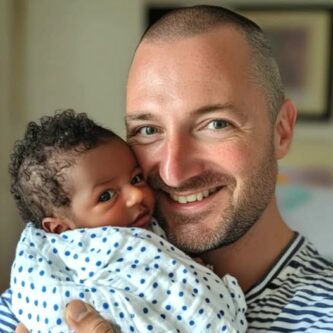There was an almost electric sense of expectancy in the delivery room. Emma, my wife, was lying on the hospital bed with her fingers clenched around mine and a look of excitement mixed with fatigue. A dreamlike atmosphere was created by the quiet voices of the nurses, the regular beeping of the monitors, and the doctor’s gentle words of encouragement.
It was this. The time we had been anticipating. Choosing baby clothes, experiencing small kicks in the middle of the night, and nine months of delight. We spent nine months wondering if our unborn child would have Emma’s golden hair. My angular cheekbones? The dimples that were inherited? Everything else in the room was broken by a piercing wail. The baby was here.

I looked over and saw the doctor gently lifting our baby, her face wrinkled up as she drew her first breaths, her tiny limbs wriggling. My eyes pricked with tears. She was flawless. But Emma’s terrified scream, which I had not anticipated, broke the moment.
“This isn’t my child!” The room became quiet. The nurses froze. The doctor paused in mid-step. I thought my wife would be overwhelmed, perhaps simply in shock from giving birth. However, the expression in her eyes was one of utter incredulity rather than simply fatigue.
In an attempt to maintain composure, one of the nurses gave a soft grin. She remarked, “She’s still attached to you,” as though to reassure my wife that nothing was wrong. Emma, however, gasped for air and shook her head angrily. “It’s not feasible! Never in my life have I dated a Black man!
The words were piercing and weighty as they hung in the air. Everyone was uncertain of how to respond, and the room remained strangely still. As I turned to face our daughter, a gorgeous newborn girl with skin that was substantially darker than either of ours, my heartbeat hammered in my ears. However, her features were definitely ours.
Emma was shaking next to me, and it felt like the whole world was tilting beneath her. I grounded her by squeezing her hand and making her look at me. I stated unequivocally, “She’s our baby,” in a firm voice. “That’s the only thing that counts.”
Emma’s gaze shifted from our daughter to me and back again. As a nurse gently placed the infant in her arms, she gasped. At first, she seemed hesitant to touch her, as though she was scared of something she didn’t comprehend. However, something changed the instant our daughter’s little fingers encircled her pinky.
She loosened her shoulders. Something softer replaced the stiffness in her face. She felt a mixture of relief, tiredness, and love as tears filled her eyes. She let out a trembling breath. She muttered, “She’s gorgeous.” The room seems to breathe once more. The nurses looked at each other but continued working. With a nod, the doctor and I exchanged a quiet agreement.
The days that followed were a haze. I found myself watching our kid nonstop while Emma recovered, trying to figure out what was going on. She had my chin, my nose, and even the same tiny frown I had as a newborn, so I knew without a doubt that she was my. However, Emma’s tirade persisted.
She had been so convinced, not because I had any suspicions or doubts about her. Emma was the first to propose the DNA test. “I just need to know,” she said one evening in a little, nearly embarrassed voice. “I do love her.” But I must comprehend.

